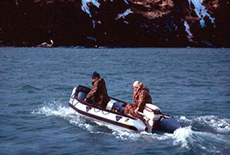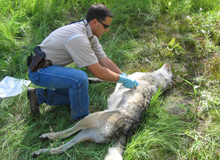Special Agents with the U.S. Fish and Wildlife Service Office of Law Enforcement
are plainclothes criminal investigators who enforce Federal wildlife laws throughout
the United States. They target criminal activities, such as wildlife
trafficking and habitat destruction, that undermine U.S. efforts to conserve
wildlife resources.
Service Special Agents work to protect threatened and endangered species,
migratory birds, marine mammals, and imperiled animals and plants around
the world. Their investigations document violations of wildlife laws
(such as the Endangered Species Act, Migratory Bird Treaty Act, and Lacey
Act) as well as such crimes as smuggling, conspiracy, money laundering, mail
and wire fraud, and false statements.
- Where do Special Agents Work?
- What do Special Agents do?
- How do I become a Special Agent?
- Are there any special requirements?
- What opportunities exist for training and career advancement?
- What benefits do Special Agents earn?
1. Where do Special Agents Work?
 Service Special Agents investigate wildlife crimes wherever they occur in
the United States. They work in settings that range from major cities
to more rural duty stations near some of the few remaining wilderness areas
in this country. Some are based in multi-agent offices in locations
such as New York City, Los Angeles, and Miami while others are responsible
for wildlife law enforcement in entire States. The duties of all Special
Agents involve considerable travel with frequent periods away from home.
Service Special Agents investigate wildlife crimes wherever they occur in
the United States. They work in settings that range from major cities
to more rural duty stations near some of the few remaining wilderness areas
in this country. Some are based in multi-agent offices in locations
such as New York City, Los Angeles, and Miami while others are responsible
for wildlife law enforcement in entire States. The duties of all Special
Agents involve considerable travel with frequent periods away from home.

2. What do Special Agents do?
Service Special Agents investigate crimes that range from international
wildlife smuggling to unlawful migratory game bird hunting. Like all
criminal investigators, they collect evidence, interview witnesses, interrogate
subjects, conduct surveillance, plan raids, make arrests, and prepare cases
for court.
Special Agents often work undercover to infiltrate wildlife trafficking
rings, illegal guiding operations, and other criminal groups to document
violations from the “inside.” Covert investigations can
range from simple “buy-bust” transactions where agents arrange
to purchase illegal wildlife from subjects to multi-year probes in which
agents establish false identities and even run wildlife businesses to gain
the confidence of the criminals they hope to expose.
 Special Agents investigate the killing of endangered species and other protected
wildlife, such as eagles, migratory birds, and marine mammals. They
support species reintroduction programs and pursue cases involving the destruction
or contamination of wildlife habitat. They investigate oil or chemical
spills and poisoning incidents that kill wildlife. They also work
with industry groups and individual companies to reduce hazards to migratory
birds and other wildlife caused by oil pits, powerlines, communication towers,
wind farms, and mining operations.
Special Agents investigate the killing of endangered species and other protected
wildlife, such as eagles, migratory birds, and marine mammals. They
support species reintroduction programs and pursue cases involving the destruction
or contamination of wildlife habitat. They investigate oil or chemical
spills and poisoning incidents that kill wildlife. They also work
with industry groups and individual companies to reduce hazards to migratory
birds and other wildlife caused by oil pits, powerlines, communication towers,
wind farms, and mining operations.
Special
Agents often work closely with other Federal, State, Tribal, or foreign
law enforcement authorities. They help Service Refuge Officers conduct
investigations of crimes that occur on refuge lands. Other examples
of common Federal partnerships include work with U.S. Customs and Border
Patrol or Immigration and Customs Enforcement on wildlife smuggling cases
and cooperative investigations with the U.S. Environmental Protection Agency
involving oil spills, industrial contaminants or pesticides.  Special
Agents team with State counterparts to enforce regulations that govern
the hunting of waterfowl and other migratory birds and assist the States
in detecting and deterring the interstate exploitation of State-protected
species, including big game animals and fishery resources. They also
assist Tribal enforcement officers when crimes involve violations of both
Federal and Tribal laws and regulations. Work with enforcement authorities
in other nations ranges from sharing intelligence to conducting joint or
parallel investigations of international wildlife trafficking.
Special
Agents team with State counterparts to enforce regulations that govern
the hunting of waterfowl and other migratory birds and assist the States
in detecting and deterring the interstate exploitation of State-protected
species, including big game animals and fishery resources. They also
assist Tribal enforcement officers when crimes involve violations of both
Federal and Tribal laws and regulations. Work with enforcement authorities
in other nations ranges from sharing intelligence to conducting joint or
parallel investigations of international wildlife trafficking.
Special Agents conduct training on wildlife law enforcement for State and
Tribal officers as well as for enforcement officers overseas. They
also respond to citizen complaints and conduct public outreach to secure
voluntary compliance with Federal wildlife laws.


3. How do I become a Special Agent?
Only some 250 Special Agents work for the U.S. Fish & Wildlife Service.
Special Agent positions are extremely competitive and highly sought after.
Consequently, only the most qualified applicants are appointed. The Service
usually hires Special Agents as a “class” of 20 or so. To begin
the recruitment process, the Service's Human Resources Office in Arlington,
Virginia, issues vacancy announcements describing available positions. Individuals
seeking information about Special Agent vacancies can check the Office of
Personnel Management's USAJobs website.

4. Are there any special requirements?
 To
qualify for a Special Agent position, applicants must meet strict medical,
physical, and psychological requirements. They must also participate in mandatory
drug testing and psychological screening programs. The most highly qualified
applicants will be interviewed. Academically, a four-year degree in wildlife
management, criminal justice, or other related fields is preferred. Those
chosen will undergo an extensive background investigation to determine suitability
for appointment to a Special Agent position.
To
qualify for a Special Agent position, applicants must meet strict medical,
physical, and psychological requirements. They must also participate in mandatory
drug testing and psychological screening programs. The most highly qualified
applicants will be interviewed. Academically, a four-year degree in wildlife
management, criminal justice, or other related fields is preferred. Those
chosen will undergo an extensive background investigation to determine suitability
for appointment to a Special Agent position.
All appointees must be citizens of the United States, at least 21 years of
age, but less than 37 years of age at the time of entrance on duty. Male
applicants born after December 31, 1959 must certify that they have registered
with the Selective Service System or that they are exempt from doing so. Appointees
must have a valid state driver’s license, and they must sign a mobility
agreement indicating a willingness to accept a reassignment to any location in
the future.
Appointees must be in excellent physical condition and pass a comprehensive
medical examination, which is provided at no cost to the applicant. The appointee
must also successfully pass a battery of tests to determine physical fitness
suitability.
Once employed, Special Agents must meet firearms qualification standards
and re-qualify each year. Periodic medical examinations are also required along
with fitness testing. Some agents are required to complete yearly financial
disclosure reports.

5. What opportunities exist for training and career advancement?
 Special
Agents begin their careers with 18 weeks of formal training in criminal investigative
and wildlife law enforcement techniques at the Federal Law Enforcement Training
Center at Glynco, Georgia. Basic training includes comprehensive courses in
protective techniques, criminal law, use of special investigative equipment,
use of firearms, and defensive measures. Rules of evidence, surveillance techniques,
undercover operations, and courtroom demeanor are also studied. When agents
report to their first duty stations, they complete a yearlong Field Training
and Evaluation Program; they work closely under the supervision of an experienced
training officer to hone their investigative skills and enhance their mastery
of wildlife laws.
Special
Agents begin their careers with 18 weeks of formal training in criminal investigative
and wildlife law enforcement techniques at the Federal Law Enforcement Training
Center at Glynco, Georgia. Basic training includes comprehensive courses in
protective techniques, criminal law, use of special investigative equipment,
use of firearms, and defensive measures. Rules of evidence, surveillance techniques,
undercover operations, and courtroom demeanor are also studied. When agents
report to their first duty stations, they complete a yearlong Field Training
and Evaluation Program; they work closely under the supervision of an experienced
training officer to hone their investigative skills and enhance their mastery
of wildlife laws.
Starting salaries for Special Agents begin at one of the GS-7/9/11 levels,
depending upon education and experience. The full performance level of pay
is GS-12. In addition to base pay, agents are compensated for availability
pay and those agents stationed in high-cost geographical areas receive additional
locality pay. Special Agents can expect to serve in several locations during
a typical 20-year career. With each transfer, employees have the opportunity
for a more diversified career progressing to their full potential. After
gaining experience in field investigations, some agents may decide to enhance
their careers and move into management positions. These positions are found
in the Resident Agent-In-Charge Offices, the Regional Offices, and the Chief's
Office in Washington, D.C. The selection process for management positions
is competitive and provides for upward mobility to positions up to the GS-15
level.

6. What benefits do Special Agents earn?
 Special
Agents with 20 years of Federal law enforcement service are eligible
to retire at age 50. Retirement becomes mandatory at age 57. Availability
pay is earned at the rate of 25% of base pay. This pay is designed
to compensate the criminal investigator for at least 2 hours of unscheduled
duty per regular workday. The Service often pays relocation
expenses when agents move to new duty stations. Low-cost health,
dental, vision, long-term care and life insurance may be obtained
through Federal employee programs. Financial protection is provided,
without cost, in the event of job-related injury or death. Annual
leave accrues at the rate of 13 to 26 days per year, based on length
of employment. Sick leave is earned at the rate of 13 days per year
and there are 10 paid Federal holidays per year.
Special
Agents with 20 years of Federal law enforcement service are eligible
to retire at age 50. Retirement becomes mandatory at age 57. Availability
pay is earned at the rate of 25% of base pay. This pay is designed
to compensate the criminal investigator for at least 2 hours of unscheduled
duty per regular workday. The Service often pays relocation
expenses when agents move to new duty stations. Low-cost health,
dental, vision, long-term care and life insurance may be obtained
through Federal employee programs. Financial protection is provided,
without cost, in the event of job-related injury or death. Annual
leave accrues at the rate of 13 to 26 days per year, based on length
of employment. Sick leave is earned at the rate of 13 days per year
and there are 10 paid Federal holidays per year.

